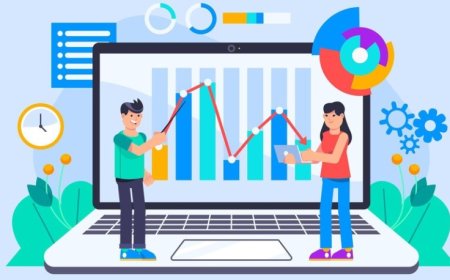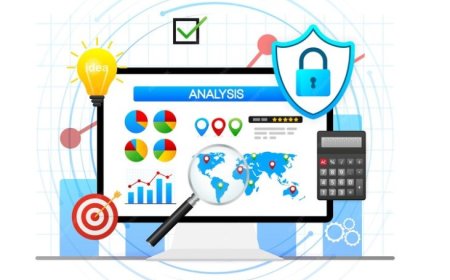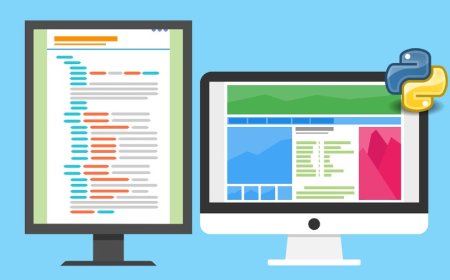Big Data and Data Science: Challenges and Opportunities
Discover challenges and opportunities in Big Data and Data Science. Learn how to leverage data for smarter decisions, innovation, and future-ready business success.
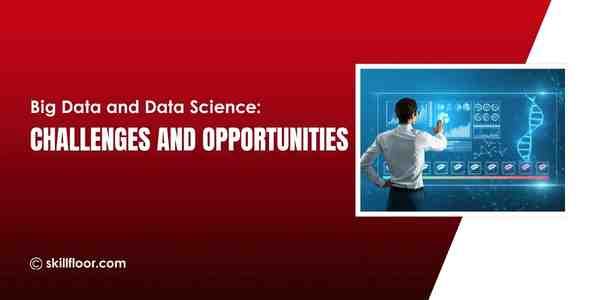
Ever noticed how businesses seem to understand your needs before you express them? In the modern digital age, a vast amount of information is produced with each click, swipe, and purchase. Businesses are transforming their operations, making better decisions, and advancing technologies like machine learning and artificial intelligence thanks to this data.
Data science and big data are the tools that transform all of this data into insightful knowledge. They support the expansion of industries, enhancing services, and deepening human understanding. But managing such vast volumes of data is not simple, and for those who know how to use it, there are both great opportunities and challenges.
In this blog, we will explore the fundamentals of Big Data and Data Science, the hurdles organizations face, and the vast opportunities that lie ahead.
Understanding Big Data
Datasets that are too big or complicated for conventional data processing technologies to handle efficiently are referred to as "Big Data." The 5 Vs are what make big data unique:
-
Volume: Massive volumes of data are generated daily by sensors, emails, online shopping, and social media posts. To effectively collect, store, and process the enormous volume, new technologies are needed.
-
Velocity: The pace at which data is created and transferred is astounding. For fast insights and prompt decision-making, real-time data from internet activity, financial transactions, and Internet of Things devices must be processed quickly.
-
Variety: Unstructured photos, videos, text, semi-structured logs, and structured tables are just a few of the various formats in which data can be found. Organizations must manage this diversity in order to analyze and derive valuable insights.
-
Veracity: Not all information is trustworthy or correct. Before drawing findings or making judgments, data cleansing and validation are essential since flaws, noise, and inconsistencies in data can mislead analysts.
-
Value: Data by itself is insufficient; turning it into insights that can be put into practice is the ultimate goal. Effective analysis makes data a true strategic asset by fostering innovation, corporate expansion, and social benefits.
Real-World Example
Global weather patterns, hospital patient health data, social media trend analysis, and real-time financial transaction management are all examples of big data. In contrast to conventional databases, Hadoop, Spark, and cloud storage systems are specialized technologies needed for effective processing and analysis of Big Data.
Understanding Data Science
Big Data is a representation of unprocessed information, but data science is the field that turns it into knowledge that can be put to use. To find patterns, predict results, and direct decision-making, it integrates methods from statistics, machine learning, data engineering, and visualization.
At its core, Data Science involves three critical steps:
-
Data Collection and Preparation: Gathering all pertinent data from various sources, eliminating errors, dealing with missing information, and appropriately structuring it are all part of this process, which guarantees correctness and dependability for analysis.
-
Analysis and Modeling: This process generates descriptive or predictive models that aid in future planning and well-informed decision-making by identifying patterns, correlations, and trends in the data using statistical techniques or machine learning algorithms.
-
Visualization and Communication: Charts, graphs, or dashboards are used to display the results once the insights are ready. Effective communication guarantees that stakeholders comprehend the results and are able to base their decisions on data that can be put into action.
One of the key objectives of data science is to transform complicated data into useful insights that assist organizations in improving their decision-making and foreseeing their needs. Data science enables businesses to anticipate consumer behavior, streamline processes, and even identify new trends. Data science is essentially the paintbrush that creates the image, whereas big data is the canvas.
The Synergy Between Big Data and Data Science
Data science and big data are inextricably related. Data Science transforms the raw information from Big Data into insights that can be put to use. Think about a retail business that examines millions of consumer transactions. Big Data records every encounter, including website clicks and sales. After that, data science forecasts consumer demands, finds buying trends, and suggests tailored marketing.
Other real-world applications include:
-
Healthcare: Data science can predict health outcomes, suggest individualized therapies, and increase overall care efficiency in clinics and hospitals by evaluating wearable device data, test results, and patient histories.
-
Finance: By identifying anomalous transaction patterns, big data and data science enable real-time fraud detection, minimize financial losses, and guarantee safer banking and payment systems for consumers.
-
Social Media: Platforms employ data to assess user behavior and provide recommendations, tailored content, and targeted ads to keep users interested and assist businesses effectively reach the proper audience.
-
Smart Cities: Data on traffic, energy, and public services are examined in order to maximize infrastructure, enhance urban mobility, effectively manage resources, and create more sustainable and livable cities.
-
Retail and E-commerce: Businesses monitor consumer preferences, browsing patterns, and transactions in order to predict demand, provide product recommendations, and create tailored promotions that improve sales and the shopping experience.
-
Manufacturing and Supply Chain: Production data and sensors are examined to forecast equipment repair requirements, maximize inventory, minimize downtime, and boost factory and logistics network operational efficiency.
Organizations must carefully handle a number of problems in order to fully reap the benefits of this potent mix of Big Data and Data Science, which also presents amazing opportunities.
Challenges in Big Data and Data Science
Despite the potential, businesses encounter a number of challenges when utilizing data science and big data:
1. Data Quality and Cleaning
Inaccurate insights might result from data that is noisy, inconsistent, or incomplete. Cleaning and preparing data prior to analysis can account for as much as 80% of a data scientist's work.
2. Data Security and Privacy
Ensuring adherence to privacy regulations such as GDPR and HIPAA is essential given the vast volumes of sensitive and personal data being gathered. Data misuse can damage public trust and have legal repercussions.
3. Data Storage and Management
Data science workflows require effective data management and storage. For big data analytics initiatives, choosing cloud, on-premises, or hybrid solutions guarantees scalable, affordable storage, easy access, and dependable infrastructure.
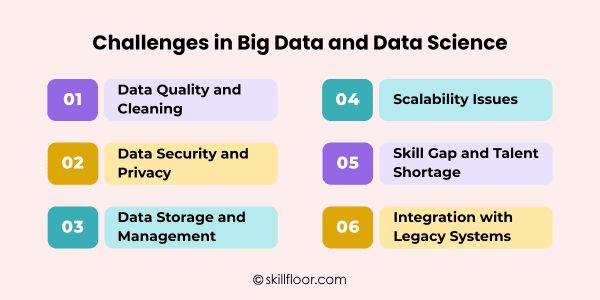
4. Scalability Issues
Scalability issues arise when processing large datasets in data science applications. Models, AI pipelines, and analytics processes are guaranteed to scale efficiently with data growth through the optimization of cloud resources, distributed computing frameworks, and high-performance algorithms.
5. Skill Gap and Talent Shortage
Talent is in scarce supply in the data science sector. Model development, data-driven insights, and the application of sophisticated AI and predictive analytics techniques all depend on having experts in machine learning, analytics, and big data.
6. Integration with Legacy Systems
Legacy systems can be difficult to integrate with contemporary data science infrastructure. In order to get precise analytics, real-time insights, and AI-powered decision-making, compatibility, smooth data flow, and efficient ETL procedures are necessary.
Opportunities in Big Data and Data Science
Even though there are still issues with big data and data science, there are also a lot of chances for innovation, predictive analytics, AI development, and data-driven decision-making that could have revolutionary effects:
1. Improved Decision Making
Organizations are empowered to make unbiased, fact-based decisions thanks to data-driven insights. Making better, quicker, and more informed strategic decisions across sectors is made possible by utilizing Big Data analytics and machine learning models.
2. Innovation in Products and Services
By effectively evaluating consumer behavior and market trends, big data and data science help businesses develop customized goods, optimize services, improve customer experiences, and find new revenue sources.
3. Predictive Analytics and Forecasting
Organizations can forecast demand, identify patterns, and proactively reduce risks by looking at historical datasets. Uncertainty is converted into useful insights for strategic planning using predictive analytics driven by data science.
4. Operational Efficiency
Supply chains, logistics, and resource management inefficiencies can be found by analyzing operational data. In large-scale company operations, data science applications streamline processes, cut expenses, and boost overall efficiency.
5. Healthcare Advancements
Predictive modeling for medical emergencies, tailored therapies, and early illness detection is all made possible by big data analytics. Research insights, improved patient outcomes, and effective hospital or medical system administration are all made possible by data science.
6. Career Opportunities
Many job options are made possible by the increasing need for qualified experts in data science, artificial intelligence, and big data. Proficiency in analytics, machine learning, and data scientists' predictive modeling abilities are becoming more and more valued in a variety of international businesses.
Case Studies/Examples
These real-world examples show how Big Data and Data Science improve decision-making, spur innovation, change industries, and generate quantifiable commercial value.
1. Amazon – Retail
Amazon effectively boosts income by optimizing inventory, analyzing user behavior, and personalizing suggestions through the use of Big Data and Data Science.
2. Mount Sinai Health System – Healthcare
Mount Sinai effectively improves healthcare outcomes, anticipates hospitalizations, and customizes treatments by utilizing predictive analytics on patient records.
3. JPMorgan Chase – Finance
JPMorgan Chase uses real-time Big Data analytics to reliably safeguard banking processes, lower financial risk, and identify fraud.
4. Netflix – Entertainment
Using data science, Netflix examines viewing habits to provide tailored suggestions, direct content production, and increase user engagement around the world.
Ethical and Privacy Considerations
Big Data and Data Science present significant ethical issues in addition to operational and technical difficulties. Fairness, public trust, and the societal benefits of analytics and AI all depend on responsible data handling.
1. Informed Consent and User Awareness
Many consumers are unaware of the methods used to gather, examine, and distribute their personal information. Transparency and significant user control over data collection, processing, and utilization choices are prerequisites for ethical data science activities.
2. Algorithmic Transparency
It might be challenging to interpret findings from even precise models. Stakeholders can comprehend how judgments, insights, and predictions are produced from intricate information when algorithmic transparency in data science is maintained.
3. Responsible Data Sharing
Innovation is fueled by data sharing, but it needs to be done carefully. Anonymization, stringent access controls, and explicit usage guidelines are examples of ethical approaches that guarantee shared data advances research or business without endangering people.
4. Bias and Fairness
Even with clean datasets, algorithms may inadvertently mirror societal biases. To guarantee fair decision-making for all populations, ethical data science necessitates reviewing models, fixing unfair results, and putting inclusive AI procedures into place.
5. Social and Cultural Impact
Unchecked use of AI and predictive analytics might propagate prejudices or affect behavior. To ensure moral, responsible, and socially conscious implementations, organizations must assess the sociological and cultural ramifications of models before implementing them.
6. Long-Term Data Stewardship
Sustainability has a role in ethics in big data. Organizations should plan for archival, data retention, and environmentally friendly storage procedures to ensure that information and computing resources are managed responsibly throughout time.
Emerging Trends in Big Data and Data Science
Looking ahead, several trends are likely to shape Big Data and Data Science:
1. Artificial Intelligence and Machine Learning Advancements
In Data Science and Big Data applications, advanced machine learning and artificial intelligence algorithms improve efficiency by enabling deeper insights, predictive analytics, and automated decision-making.
2. Edge Computing and Real-Time Analytics
Modern Data Science systems benefit from real-time analytics, quicker insights, and more rapid decision-making made possible by edge computing, which processes data at its source.
3. Data Democratization
Encouraging a broad data-driven culture, user-friendly analytics solutions enable non-technical users to access, analyze, and utilize Big Data insights.
4. Ethics-First Data Governance
Businesses are adopting ethical frameworks more frequently, giving transparency, privacy, and responsible AI top priority. This ensures that Data Science processes are reliable and Big Data operations are compliant.
5. Cloud-Native Analytics and Hybrid Infrastructure
Scalability, storage, and processing capability are improved by cloud and hybrid infrastructures, which smoothly handle Big Data analytics and intricate Data Science models.
6. Automation and Augmented Analytics
Big Data and advanced data science are used to enable quicker, more intelligent business decisions by speeding up data interpretation through automated data pipelines, AI-driven insights, and enhanced analytics.
Big Data and Data Science are the keys to understanding our environment and making better decisions, and they are more than just tools. Although managing a large amount of data can be daunting, the opportunities they present are incredible. The possibilities are endless, ranging from trend forecasting to healthcare improvement, product development, and the emergence of fascinating professional pathways. Learning, exploring, and responsibly using data may help us make better decisions, develop more quickly, and influence the future in meaningful ways. Now is the time to get started.



















































